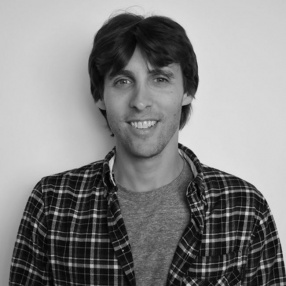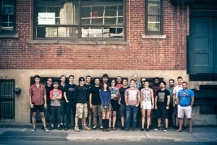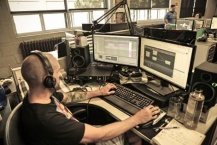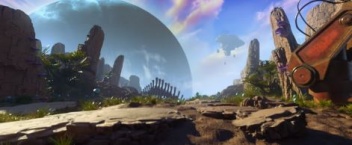You’re based here in Montreal, and it seems to me there’s a lot of games talent in this part of the world. And a lot of it is PC, rather than mobile. Why do you think that might be?
One of the main reasons the industry is so strong here is that there’s a lot of financial support – maybe you’re familiar with the tax credit programme? They’ve made it favourable for companies to operate here. Alliance Numerique commissioned a study which figured out for every dollar that the Quebec government is paying out in subsidies to developers, how much they’re getting back in tax revenue! They realised that actually, because we brought so many companies to the province, the government’s actually making money out of this deal. Which is great.
So the government created a technical and a games business here, and it’s become one of the hubs of the world in terms of how many game developers are actively working here. That’s why there’s such a concentration here. The federal government also does a decent job with the research and R&D credits. What they call the multimedia tax credit, is the major reason that EA came over here, and Eidos opened up shop here. Ubi’s always been here. Ubi was one of the first ones. Warner Bros came here. So all these companies kind of came for that reason. And then they stayed, obviously, because there’s a great talent pool, and talent brings other talent.
And the second part of your question – why PC? PCs always been a natural development platform. So now consoles are becoming more friendly to indies, which is great, but if you think 15 years ago that wasn’t the case, in terms of getting an independent game on a platform. That was hard, if not impossible. So I think a lot of us grew up developing on PC and bringing it to consoles. That’s probably one of the reasons why there’s a native PC following here. People are just familiar with it.
Who was your first employee – the first person to join you founders?
Our head of art. We had worked together at Warner Bros.
After I had quit, I didn’t approach anyone. But he basically had known Alex and me, and he approached us. “I want to get out of the big studio system. I want to have a bigger impact.” And we were like, “That’s great.” His name is Erick Bilodeau, and he’s a monster-type artist. He’s fantastic. So he wanted to work with a small group but have a bigger impact. He was the first one. It was good because I have zero artistic talent [laughs]. So it worked out well.
When we started, we weren’t in this office. We didn’t want to pay rent, because we had no money. So we were working in a [motion capture] studio. I don’t know if you’ve ever been in a MoCap studio?
This room was all black, with backlit walls. Day one, we went to Ikea and we bought some desks. And then we found a guy on Craigslist who sold used office furniture. So the three of us were sitting in a MoCap room. No windows, all black, padded walls. We had no idea what time it was. It could have been nuclear winter outside. We had no idea what was going on.
But the cool thing was, we didn’t have to pay rent, and that was kind of how we worked for a while. We still have one of the whiteboards that we bought. We still use it to this day, because it’s a really gentle reminder.
It was not awesome. When we finally moved out of there, we had a temporary office, and it was literally in a basement, and there was no air conditioning. We were sweating all the time. It was gross. Because it’s in a basement, there was a window kind of up high, and literally, you would sit down and you would see people smoking or vaping, and you were getting all this second-hand smoke again.
So finally, we got this space!
Once we lined up some funding. We knew that you can’t keep people working in a gross place. Between all the computers and the people, it was hot, and there was no air circulation.
At the moment, a hot topic in games development is about toxic working practices and crunch deadlines. You guys seem really chilled, with a dog walking around. Perhaps hard deadlines are inevitable for everybody in the end, but what’s your take on the industry at the moment? Is game development a hard place to work? What’s Typhoon going to do about it?
It is definitely challenging. Generally, teams are really passionate about what they’re doing, and they always want to make something better. There comes a certain point in time when you have to ship it, or the publisher sends it, or you run out of funding, or any of these number of permutations.
It’s a great question, because as games get bigger and bigger and bigger, it becomes like anything else: people become so hyper-specialised, and they’re doing this one little thing, and it’s really hard to see the forest for the trees.
When we were setting up the company in terms of values and culture – what we wanted to create was a place where people can come and do their best work. What we found, which was really interesting, was that we had a lot of senior-level people who really wanted to go back to the craft of just working with a small team. Like when we started out back in the 90s when teams were 20, 30, 40, 50 people max. So a lot of people wanted to come back to that. We had a lot of interest, more than we thought, from these senior level people who were just like, “You know what? I’m kind of done with that huge studio environment.”
If you imagine that you’ve got a team of 20 people or 25 people, that means every person is four to five per cent of the workforce. Everyone’s got to be pretty kick-ass, and everyone’s got to be able to depend on everybody else. We wanted [Typhoon] to be a place where people can do their best work, and it’s friendly and upbeat, and it’s a place where people wouldn’t be afraid to go out on a limb and take risks and to try things that are cool and different. Again, if you’re dealing with $100 million, that’s a hard thing to do, because it can go sideways quickly.
We really over-indexed on hiring people who are not just great at their job, but positive, focused people! Because it’s really, really easy when you’re in the thick of it for people to get negative. We’ve really focused our effort on: how do we find people who are very positive. People who are their own biggest critics in terms of how they can make the work great, but also people who are going to be a really positive cultural fit.
We have made mistakes since we’ve started, and there are people who are no longer here, who just didn’t fit that culture we’re trying to build. But as of November 2018, we’re pretty excited about the vibe and type of studio. Culture is one of those things that takes months or years to build.
We are obviously a start-up, but we’ve still really made an effort that people, when they’re coming here for eight hours a day, focus. Make something awesome. Really, really put your heart and soul in it. People have kids and they have lives, they’re all ageing up, so we also want people to still have their lives out of work. 100-hour weeks are not a norm here in any way. Even though it’s a start-up! But what we do expect is that when you are here during the day, put everything on it, and really make it count. But then go home and be with your kids or your boyfriends, girlfriends, dogs. But when you’re here, put everything into it.
You guys have a background in the games industry, and you’ve got a start-up now. Do you have advice for people who want to do the same? Developers around the world, sitting in a big studio, who have got some ideas – what would you tell them?
I think probably one of the things they’ll be learning early on is that starting a studio is an all-encompassing endeavour. It’s not like getting another job. Once you commit, you really have to commit.
In the beginning, we bootstrapped the company, where we had our own money, and we all put some cash in. And we weren’t taking any salary, but we were paying a few people working. We were paying them, and we weren’t paid. It’s kind of a unique environment. You have to be ready to take the lifestyle you’re used to and throw it on its head. It’s not for everyone.
But we’d always wanted to do it. We’d always talked about it. We joked as well: “Either we’re going to do it, or we’re going to stop talking about it because otherwise, we’re just bullshitting ourselves.”
Step one is to really, really understand what you want to build.
And in terms of starting up a company and all that stuff: don’t underestimate how much time is spent doing things like legal and financial paperwork. Things take a long time. Sometimes, start-ups are employing full-time admin or help. It’s not for us. We put everything in the game, and we operate quite lean in that regard. And we’re also very transparent with people.
When we were deciding on which publisher we were going to sign with, we were open with the people who worked here with: “These are the options on the table. This is what we’re thinking. What do you guys think?” People aren’t stupid. And I think people have a really good bullshit-detector. So it’s being upfront and saying, “This is what we’re thinking. This is why we’re doing it.” That doesn’t mean that everyone has to agree, but I think it’s really important that people understand why we’re doing something, and why we’re making a decision.











